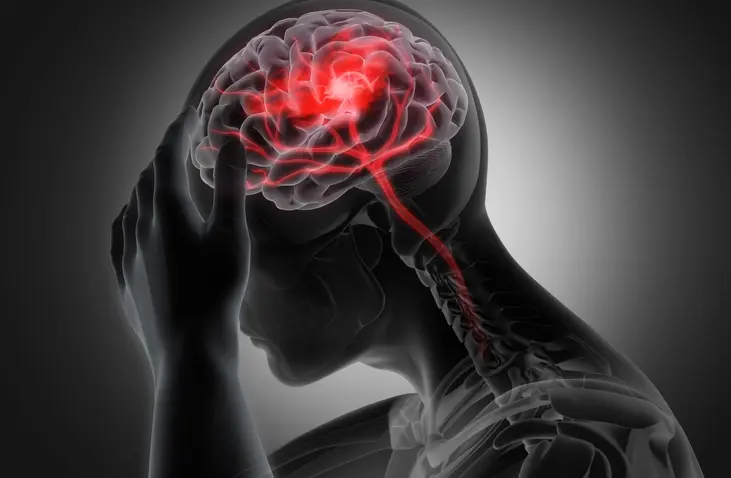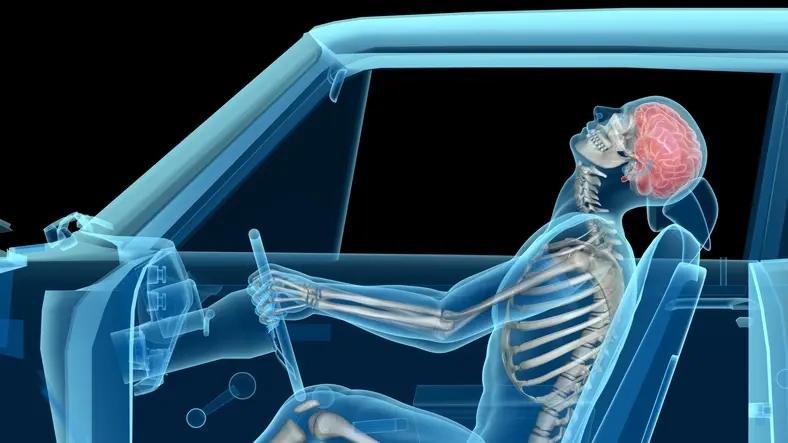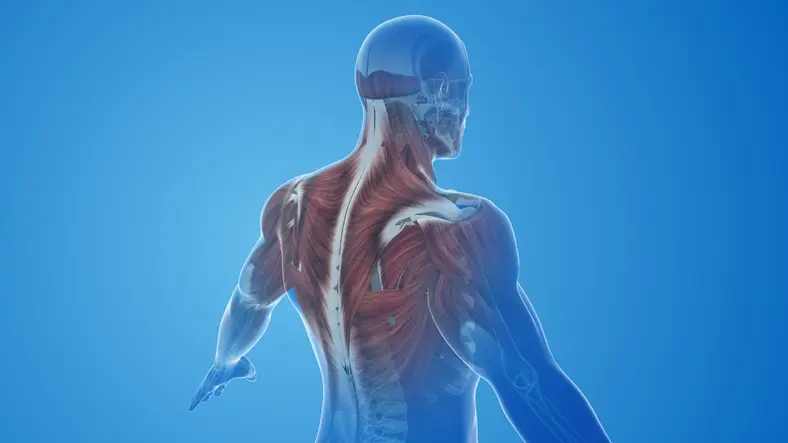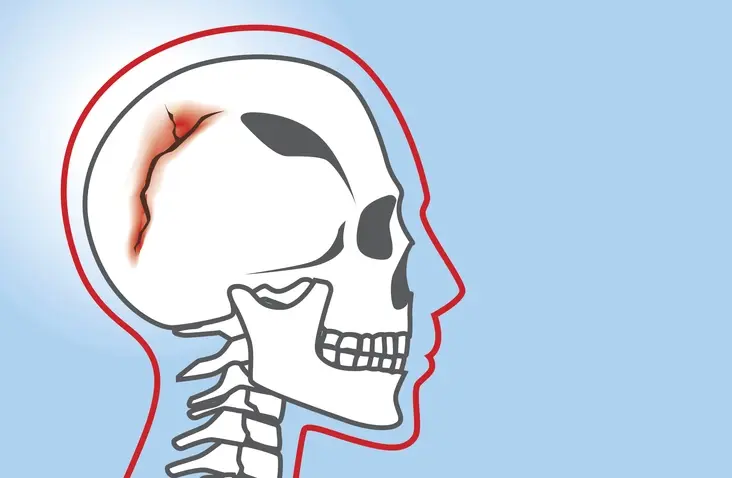A headache after a car accident should not be ignored due to the possibility of traumatic brain injury (TBI) and other injuries. Examples of potential injuries include:
- Neck injuries
- Blood clots in the brain
- Concussions
- Whiplash
Even though you may experience post-traumatic headaches, they can be signs of something serious later on. Symptoms of a brain injury may not show up immediately and can take time to develop.
Seek immediate medical attention if you experience a headache after a car accident. After receiving treatment, file a legal claim with an expert auto accident attorney to earn compensation for your losses.
Free Auto Accident Evaluation
Hurt in a wreck that wasn’t your fault? Click here to speak with a nearby attorney for FREE about your Auto Accident claim.
or call (888)-927-3080
What Causes a Headache After a Car Accident?
A car accident may cause a headache due to a concussion or other injuries to the head or neck. The concussion may come from an immediate impact to the head and is common in car accidents, even when it doesn’t involve direct contact.
Common causes may include the following events:
- Victims hitting their head on the steering wheel, the dashboard, a window, or other objects in the vehicle.
- Occipital neuralgia, or pinching on the nerves or muscle tightness in the neck.
- Muscle injuries (tears, strains, and spasms) in the neck and upper back areas.
- Disc herniations or spine swellings.
These headaches are often caused by rear-end collisions due to the way they cause a driver or passenger’s head and neck to violently lash forward and backward.
Types of Headaches After a Car Accident
The brain’s sensitivity to stress and trauma may result in multiple types of headaches after a car accident. Typically traumatic brain injuries are separated into two types:
- Closed brain injuries
- Penetrating brain injuries
A closed brain injury involves trauma to the brain that does not penetrate the skull. This form of injury occurs when the brain rapidly moves back and forth inside the skull, causing bruises and tearing. Car accidents are the perfect high-movement environment for closed brain injuries to occur.
A penetrating brain injury happens when the brain suffers trauma that breaks through the skull. An example of a penetrating brain injury would be if a bullet pierced the skull and entered the brain.
These two types of brain injuries make up all of the headaches you may experience after a car accident. The brain reacts to trauma differently for each person, so different forms of headaches may occur.
Traumatic Brain Injuries (TBI)

Traumatic brain injury often happens during a violent blow or shake to the head or body. A mild brain injury may affect your brain temporarily whereas severe brain injury may result in bruising, torn tissues, bleeding, and other physical damage to the brain.
- Physical symptoms—headaches, nausea/vomiting, fatigue, dizziness, and difficulty in speaking.
- Sensory symptoms—blurred vision, ringing in ears, distaste in the mouth, and sensitivity to light/sound.
- Cognitive & behavioral symptoms—loss of consciousness, confusion, memory loss, mood changes, sudden feelings of depression/anxiousness, and difficulty sleeping.
According to the Centers for Disease Control and Prevention (CDC), about 190 Americans died from TBI-related injuries every day in 2021.
- Over 214,000 TBI-related hospitalizations in 2020.
- TBI is a major cause of death and disability, with over 69,000 TBI-related deaths in the United States in 2021.
Seek immediate medical attention if you suffer a traumatic brain injury after a car accident. Failure to address your injuries may result in serious physical and mental harm or even death.
Whiplash Headaches

Often caused by rear-end collisions, whiplash headaches are one of the most common headaches after a car accident. Whiplash headaches are caused by sudden movements flexing the head backward and forward. This stretches and sometimes tears the neck and upper muscles.
Headaches after a whiplash injury often causes pain in the back of the head. The injury may cause intermittent or constant pain to the temple, top/front of the head, or down the neck.
Sprains or strains predominantly cause whiplash headaches and will take about 6-8 weeks to resolve. Make sure to never ignore whiplash headaches after a car accident because symptoms are often delayed. You may not know you have a severe whiplash injury until days or weeks after the accident.
Muscle Contraction Headaches

Muscle contraction headaches occur when your neck or upper-body muscles are tense or injured due to outside trauma. They may form due to a sudden jolt on the neck and head, tearing soft tissues.
Muscle contraction may reduce your range of motion, cause tenderness on the affected area, and redness or swelling. Symptoms could lead to memory loss, confusion, irritability, dizziness, or sleep problems.
Fracture Headaches

A fractured skull or neck bone can cause severe headaches after a car accident if not addressed immediately. It’s entirely possible that the extreme force of a vehicle collision can break one’s bones in the upper body.
Warning signs of a fracture headache include: nausea, confusion, difficulty speaking, or a stiff/imobile neck.
Pinched Nerves

Also known as an occipital neuralgia headache, this occurs during a spine herniation, or when a disc is too compressed. This compression may pinch the nerves around the neck at the skull’s base or the upper neck.
When a person experiences these nerve contractions, victims may experience a burning pain, along with numbing or tingling.
Steps to Take After a Headache From a Car Crash
Headaches after a car accident may range from mild to severe, but even mild symptoms require brain injury recovery. Depending on the type of headache you’re suffering from and its severity, it may require different types of treatments.
After a headache from a car crash, you’ll need to find a medical professional specialized in traumatic brain injury. Here are some steps to take when suffering a headache after a car crash.
Find Immediate Medical Attention
A neurologist may examine your nervous system to see the extent of your nerve damage after an accident. You may require an occupational therapist to gradually grow accustomed to your injuries if they’re long-lasting. Head injury patients after a car accident will often get prescribed opiates to ease the pain.
After your treatment is resolved, you should seek an auto accident attorney to help you with your case. Hospital bills and treatment are costly, so finding an experienced attorney can help you get compensated for your pain and loss.
Document the Evidence
It can be stressful to go through a car accident while your headaches get worse and worse. However, during hospitalization, you should ask for documentation of your injuries. Retain copies of your hospital and physician’s medical records, imaging, diagnostics results, and prescriptions.
Get the police involved and file a police report as evidence of the incident. Take pictures of both parties’ cars and get the other party(‘s) contact information.
It’s important to record evidence because every article can contribute to suing the negligent party for compensation.
When Do Symptoms of Headaches Start?
Symptoms of headaches start depending on how minor or severe your injury may be. You typically may feel the pain within hours to days after the car crash. However, it’s possible to not feel symptoms until months after the collision, depending on the nature of your injury.
Seek medical help as soon as possible because delayed head injuries can turn into serious conditions you’re not aware of.
Why You Should Never Ignore a Headache After a Car Accident
You should never ignore a headache after a car accident, no matter how minor the injuries seem to be. Post-traumatic headaches can be delayed, which causes undetected damage to grow more serious over time.
You do not want a life-threatening condition like a TBI, concussion, or a closed head injury to not be diagnosed.
Getting immediate medical attention helps with documentation and can be used as evidence for your insurance company. If things take a turn, you may need to fight for your rights in court to compensate for your losses.
Ask yourself these questions when you are involved in a car crash and see if the answers align with a possible brain injury:
- Do you feel a dull, aching pain on your head during the accident?
- Is there a tightness or compression on the sides, forehead, or the back of your head?
- Do you feel tenderness on your scalp, neck, and shoulder muscles?
- Any feelings of nausea or light-headedness?
- Are you losing your appetite?
- Did you feel like losing consciousness at the time of the accident?
If you say yes to any of the above following, you may have brain injuries that must be dealt with immediately.
An Attorney May Know Whether Your Case Qualifies for Compensation
LegalASAP can help you find an attorney who may know whether your case qualifies for compensation. Our company is connected with attorneys across the United States, willing to help you with your claim.
An experienced auto accident attorney can help you resolve any questions or concerns involving a car accident.
Fill out this free quick evaluation form, and we’ll try to connect you with someone who can help you with your claim. For questions or inquiries that cannot wait, you may call our hotline at 888-927-3080.
Cassandra Nguy
Cassandra Tran Nguy is a legal writer living in Los Angeles, California. She graduated cum laude from California State University, Northridge with a B.A. in English Creative Writing and a minor in Marketing. Visit her online profile at linkedin.com


